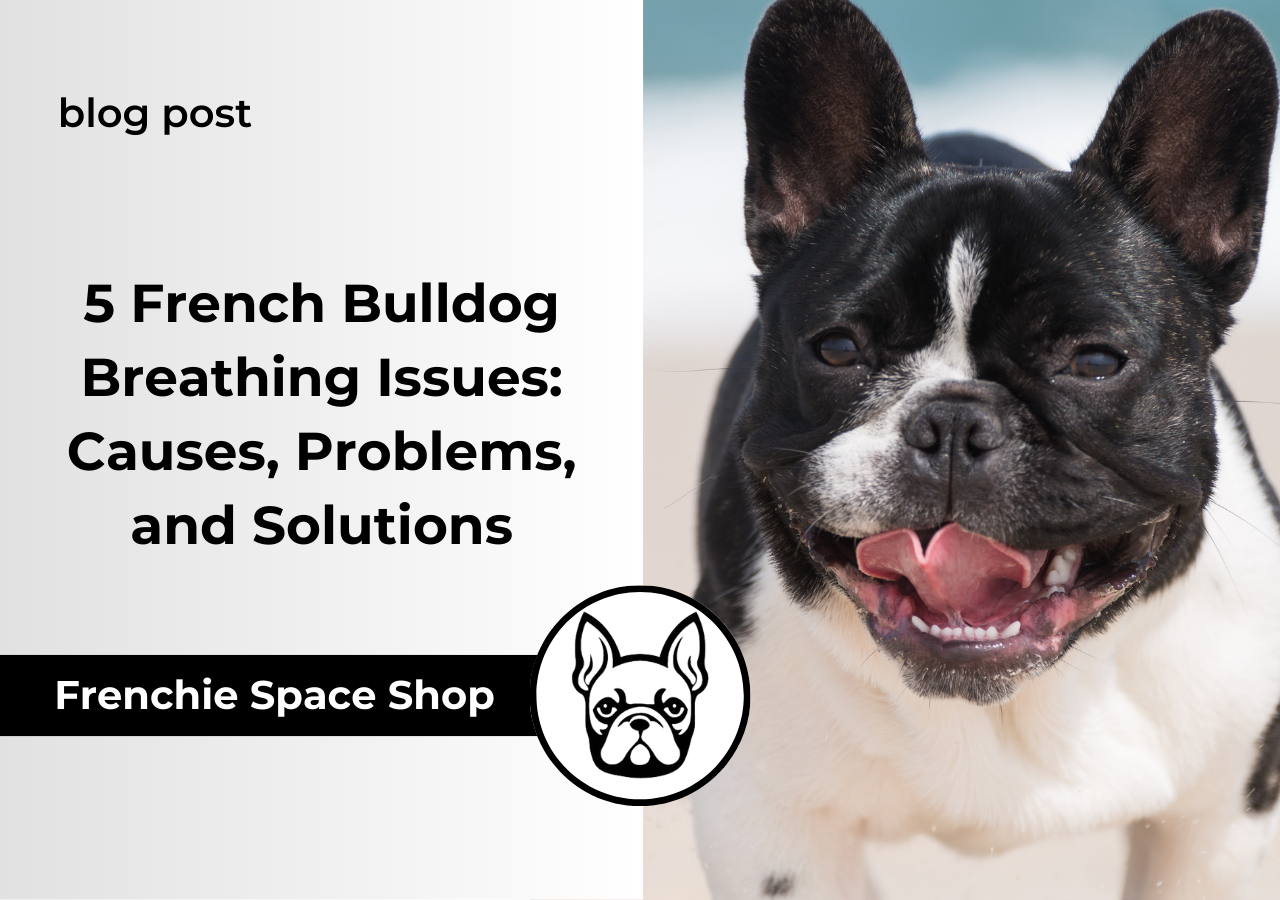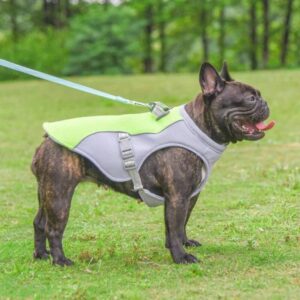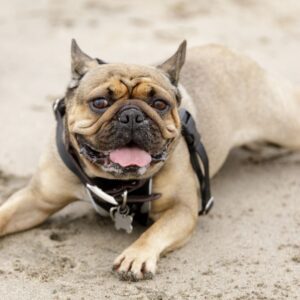5 French Bulldog Breathing Issues: Causes, Problems, and Solutions

Many pet parents ask, “do Frenchies have breathing problems?” The answer is unfortunately yes. French Bulldogs are prone to various breathing issues due to their “brachycephalic” anatomy (flat faces and short snouts). Research found that 66% of French Bulldogs have some breathing problems (such as narrow nostrils or airway syndrome). And it’s not just Frenchies. Dealing with French bulldog breathing issues is not easy and the truth is that many bulldog breeds share similar respiratory struggles.
In this post, we’ll reveal why French Bulldogs struggle to breathe, the common breathing issues they face (from snoring to BOAS and “breathing attacks”), and how to help your Frenchie breathe better. We’ll also cover what to do if your Frenchie overheats or gets too cold.
We will also discuss breathing surgery options (including approximate French Bulldog breathing surgery cost in the US and UK). Our goal is to help you keep your lovable Frenchie safe, comfortable, and breathing easily!
Why French Bulldogs Struggle to Breathe (Brachycephalic Anatomy)
French Bulldogs have adorable smushy faces, but those cute looks come with a price: anatomical features that make breathing a challenge.
Brachycephalic (flat-faced) breeds like Frenchies have short skulls and noses, which leads to a compressed airway and excess soft tissue in their airways. Here are a few key anatomical reasons Frenchies often have breathing trouble:
- Narrow nostrils (Stenotic Nares): Many Frenchies have very small or pinched nostril openings, making it hard to draw in air. If you look at your Frenchie’s nose, you might notice the nostrils barely flare – this means less airflow with each breath.
- Elongated Soft Palate: The soft palate (tissue at the back of the roof of the mouth) is often too long in French Bulldogs, hanging down into the airway. This can partially block the throat, causing snorting, gagging, or loud breathing.
- Small or “Hypoplastic” Trachea: Some French Bulldogs have a smaller-than-normal windpipe. A narrow trachea increases resistance to airflow.
- Everted Laryngeal Saccules: Chronic heavy breathing can cause small airway tissues to vert (turn inside-out) and further obstruct the airway – often a secondary issue that worsens breathing over time.
BOAS as one of the most common French bulldog breathing issues
All of these issues together are part of a condition called BOAS (Brachycephalic Obstructive Airway Syndrome). Essentially, a Frenchie’s upper airways are crowded and narrowed, so they have to work harder to get air.
This becomes especially problematic during exercise, excitement, heat, or stress, when dogs normally need to breathe faster.
A French Bulldog may not be able to take deep or fast enough breaths to meet their oxygen needs, leading to a scary cycle of panting, distress, and even collapse if not managed.
The result? Noisy breathing, snoring, snorting, and exercise intolerance are common in Frenchies. Most French Bulldog owners are familiar with those loud snuffles and snores. While a little snoring can be normal, it’s important to recognize when your Frenchie is truly struggling. Next, we’ll go over the specific French Bulldog breathing issues commonly experienced, and how to spot them.
5 Common French Bulldog Breathing Issues
French Bulldogs can experience a range of breathing issues. Below are the most common problems, what they sound or look like, and why they happen:
Brachycephalic Airway Syndrome (BOAS)
The Overall Breathing Problem:
This isn’t one single disease, but a combination of anatomical issues as described above. BOAS in French Bulldogs often manifests as constant snorting, labored breathing, loud snoring, and intolerance to exercise or heat.
A Frenchie with BOAS may gasp or tire easily on walks. Nearly all Frenchies have some degree of BOAS, but it ranges from mild (just noisy breathing) to severe (frequent oxygen deprivation).
Keep an eye out for signs like open-mouth breathing even at rest, loud raspy breath sounds, or gum/tongue discoloration. Severe BOAS requires veterinary attention to prevent heart problems or collapse.
Breathing “Attacks” (Reverse Sneezing or Respiratory Distress Episodes)
Owners sometimes report their Frenchie having a “breathing attack” – suddenly honking, snorting or seeming unable to catch their breath. Often, this is due to reverse sneezing, which is a rapid inhalation spasm.
It can be triggered by irritants (dust, pollen), excitement, eating or drinking too fast, or pulling on the leash. During a reverse sneeze, your Frenchie will extend their neck, suck in air noisily, and make a snorting/honking sound (it can look and sound scary!).
The good news is reverse sneezing is usually harmless and passes on its own within a minute or so. To help, you can gently massage your dog’s throat or cover their nostrils for a moment to make them swallow, which often stops the spasm.
However, if your French Bulldog’s breathing attack doesn’t resolve quickly, or they show severe distress (gums turning blue, collapsing), it could be an emergency – get to a vet immediately.
(For more detail on these episodes, see our blog post on French Bulldog Reverse Sneezing: Is it Dangerous or Normal?).
Fast Breathing (Panting or Tachypnea)
French Bulldog breathing fast is something you’ll notice if your pup is overheating, overexerted, or stressed. Panting is normal for dogs to cool down, but excessive rapid breathing when at rest can signal a problem.
Frenchies often breathe fast because they struggle to get enough oxygen with each breath – their body compensates by taking more breaths per minute. If you notice unusually fast breathing or panting in cool conditions, or your Frenchie’s sides heaving quickly even when lounging, pay attention.
It could mean they are in pain, excited, overweight, or overheating, or even indicate heart or lung issues. Always make sure a panting Frenchie has water and a cool environment, and if breathing doesn’t slow down after a few minutes of rest, consult your vet.
“Congested” Breathing Sounds
Many Frenchie owners describe their dog’s breathing as sounding congested or snuffly. French Bulldog breathing sounds congested due to the narrow nasal passages and excess tissue in the airway.
It’s similar to how we sound when we have a stuffy nose. Your Frenchie might snort, snore, or sound like they have a constant cold. Often, this is normal for the breed – but sometimes, true congestion can be due to a respiratory infection like a cold or kennel cough.
If your Frenchie is making wet, phlegmy sounds or has nasal discharge and a cough, it might be more than just anatomy. In case of any cough or unusual mucus, get a vet check to rule out infections. (You can also read our guide on Kennel Cough in French Bulldogs: How To Treat It? for tips on helping a Frenchie with a cough.)
Regularly clean your Frenchie’s nose folds and keep their environment dust-free to help them breathe clearer. A humidifier in the room can also ease congestion and snoring by keeping airways moist.
Heavy Breathing During Sleep (Snoring & Sleep Apnea)
French Bulldog breathing heavy when sleeping is extremely common. If your Frenchie sounds like a little chainsaw at night, you’re not alone!
Snoring happens because when your Frenchie relaxes in sleep, the soft palate and tongue can partially block the airway, causing that rattling snore. Usually it’s harmless, but very loud or labored breathing in sleep could indicate obstructive sleep apnea. It’s where they actually pause breathing for a moment (you might notice your dog startle awake or change position to breathe). To help your Frenchie snooze easier, provide an orthopedic bed with a pillow or bolster so they can elevate their head.
Many French Bulldogs sleep better with their head propped up, which reduces airway obstruction. Keeping the air slightly humid and maintaining a healthy weight will also reduce snoring. Obesity can make sleep breathing issues much worse, so if your pup is a bit chubby, a diet plan might literally help them breathe easier at night.
For many obese Frenchies, raw diet works best. It’s because they’re also prone to allergies, flatulence and skin issues. And, as you can guess, Frenchies who eat raw ingredients have shinier coat, healthier skin, and better overall health.
How to Help Your French Bulldog Breathe Better
As a Frenchie parent, there are many steps you can take to improve your bulldog’s breathing and overall comfort. Here are some friendly tips on how to help your French Bulldog breathe better (most apply to any bulldog breed, so they’ll also answer the question of how to help a bulldog breathe better in general):
Keep Your Frenchie Cool
Heat is the enemy of brachycephalic dogs. Because Frenchies can’t pant efficiently, they overheat quickly.
Avoid exercise during the hottest part of the day, and always provide shade and water on warm days. Use cooling products like dog cooling vests or mats in summer. Indoors, fans or AC help a lot. Preventing overheating will dramatically reduce breathing stress.
In our store, you can find a French bulldog cooling vest that will help you keep your pooch cool in hot weather. It should be worn wet, and as your dog walks, the vest will help him/her maintain the optimal body temperature.
Maintain a Healthy Weight
Extra pounds can worsen French Bulldog breathing problems by pushing on their lungs and airways. Frenchies love treats, but obesity will make breathing much harder and can even cause more snoring. Keep your pup at a fit weight through a balanced diet and gentle exercise. It will improve their breathing and overall health.
Use a Harness, Not a Collar
When walking your Frenchie, opt for a good harness instead of a neck collar. Pulling on a collar can compress their airway and trigger coughing or reverse sneezing. A harness keeps pressure off the throat and is much safer for bulldogs prone to breathing issues.
Check our collection of French bulldog harnesses in case you’re searching for the right one. For the summer season, make sure you choose the one that is made of mesh.
Humidity and Air Quality
If the air in your home is very dry (especially in winter with the heater on), consider a humidifier. A bit of humidity can ease your Frenchie’s congested breathing and snoring by soothing their airways. Also, keep your home clean of dust, smoke, and aerosols. Irritants can trigger breathing problems. Never smoke around your Frenchie (smoke is very harsh on their sensitive airways).
Elevated Sleeping Position
As mentioned, give your Frenchie a bed with a pillow or bolster so they can sleep with their head slightly raised. This simple change helps open up their airway during sleep and can reduce snoring and nighttime breathing discomfort.
Monitor Exercise and Excitement
French Bulldogs often don’t know their own limits – they’ll run and play until they suddenly stop, panting hard. It’s up to us to limit strenuous exercise and give lots of breaks. Keep play sessions short and sweet.
Watch for signs of labored breathing: if your Frenchie is breathing fast, coughing, or seems tired, it’s time to rest in a cool area. Similarly, excitement (like visitors arriving) can set off heavy breathing or reverse sneezes; try to calm your pup and maybe teach them to sit for a treat to avoid over-excitement.
By following these tips on how to help your French Bulldog breathe easier, you’ll greatly improve your pup’s quality of life.
Small adjustments like those above can prevent many problems and keep your Frenchie comfortable. However, some Frenchies with severe anatomical issues might still struggle – that’s when professional veterinary help is needed, which we’ll discuss next.
When to See a Vet for French Bulldog Breathing Issues
It’s important to recognize when your French Bulldog’s breathing issues need medical attention. Call your vet if you notice any of the following:
- Constant labored breathing or panting at rest (not just after play).
- Wheezing, whistling, or high-pitched noises when breathing.
- Blue or pale gums/tongue (a sign of lack of oxygen – emergency!).
- Frequent collapses or fainting episodes after activity (also emergency).
- Difficulty eating or choking on food often (elongated palate might be interfering).
- Very poor exercise tolerance – e.g., your Frenchie can barely walk a block without distress.
A vet check can determine if an infection, allergy, or anatomical obstruction is at fault. They might recommend medical management (like anti-inflammatory medications, inhalers, or weight loss). In severe cases, your vet may suggest surgical intervention to physically improve your Frenchie’s airway.
Breathing Surgeries for French Bulldogs (What to Expect)
When lifestyle changes aren’t enough, surgery can dramatically help a French Bulldog breathe better. The two most common procedures are nostril widening (stenotic nares surgery) and soft palate resection.
Often both are done together. Essentially, the surgeon will open up those tiny nostrils by removing a wedge of tissue, and/or trim the excess soft palate so it no longer blocks the airway. In some cases, they may also remove everted laryngeal saccules if present. These surgeries are collectively often called “BOAS surgery” or French Bulldog breathing surgery.
What is the French Bulldog breathing surgery cost?
It can vary by location and how much needs to be corrected. In the United States, costs for brachycephalic airway surgery generally range from about $500 to $1,500 for a soft palate resection, and $200 to $1,000 for stenotic nares repair.
Some clinics package them together; a full corrective surgery (nares + palate + any other necessary tweaks) might total roughly $1,000 to $2,500 USD in many areas. Prices depend on the surgeon’s expertise, the region, and whether extensive hospital care is needed.
If you’re in the UK, you might be wondering about French Bulldog breathing surgery cost UK. UK costs can also vary, but on average BOAS surgery in the UK runs around £2,500 for an all-inclusive procedure at a specialist clinic.
Some places (like non profit veterinary hospitals or universities) may offer it closer to ~£1,000 if it’s a simple case, while top referral centers could be higher. Always consult with your vet. They can give you an estimate based on your Frenchie’s specific condition.
Surgery may sound scary, but many Frenchie owners report life-changing results after their dog’s airway surgery. Post-op, you can expect your pup to have a quieter breath, more stamina, and a happier demeanor once healed. Of course, there are risks with any surgery, especially because brachycephalic breeds need careful anesthesia. Make sure to choose an experienced vet or surgeon for this procedure.
Recovery usually involves keeping your Frenchie calm and rested for a week or two, feeding soft food, and watching for any swelling. Your vet will guide you on post-op care. (For more insight, check out our article on 8 Key Facts About French Bulldog Nasal Surgery You Must Know – it covers benefits, costs, and recovery tips.)
Most importantly, breathing surgery can prevent serious health crises. A Frenchie struggling daily to breathe is at risk for fainting, heat stroke, and even heart strain. Correcting the anatomical issues early (often vets recommend considering it when the dog is young, around 1 year old, if needed) can add years to your Frenchie’s life. It’s a big decision, but one that can significantly improve your Frenchie’s comfort and ability to enjoy things like a gentle walk or a full night’s sleep.
Overheating and Hypothermia: Emergency Breathing Situations
French Bulldogs are extremely sensitive to temperature, and both overheating and chilling can cause dangerous breathing issues. Here’s what to do in these scenarios:
When Your Frenchie Overheats (Heat Stroke)
Brachycephalic breeds like Frenchies are prone to heat stroke because they can’t pant effectively to cool down. If your Frenchie is excessively panting, drooling, weak, or collapse in hot weather, act fast – heat stroke is life-threatening.
Move your dog to a cool area immediately. Offer water (small amounts). Begin cooling them down with tap water – you can spray or pour room-temperature water over your Frenchie’s body and use a fan to speed evaporation.
Focus on the belly and paws with cool water. Do NOT use ice-cold water or cover them with wet towels, as that can trap heat. On the way to the vet (yes, you should head to the vet ASAP for heat stroke), keep the AC on in the car. Heat stroke can cause swelling in the airway, making breathing even harder, so your vet may need to provide oxygen or anti-inflammatory meds.
Quick cooling and veterinary care can save your Frenchie’s life if they overheat. Prevention is key: never leave a Frenchie in a hot car, avoid midday heat, and always watch their breathing in warm weather (if you see fast breathing or loud panting, it’s time to cool down!).
When Your Frenchie Gets Too Cold (Hypothermia)
On the flip side, Frenchies don’t do well in cold either. They have a short coat and the same breathing issues. If a French Bulldog gets too cold, their breathing can slow and become shallow, and they could go into shock. Signs of mild hypothermia include shivering, lethargy, and shallow breathing.
Bring your dog indoors to a warm room right away if you suspect they’re too cold. Wrap them in warm blankets or towels (you can warm blankets in the dryer first). You can hold them against your body for shared warmth. If they’re wet, dry them off gently. For moderate hypothermia, you might use warm (not hot) water bottles wrapped in a cloth and place them near (not directly on) your dog’s body.
Always warm a dog gradually – not with a hot bath or direct heat, which can cause shock. Keep movement minimal and contact a vet immediately, as moderate to severe hypothermia needs professional treatment (like warm IV fluids). To prevent hypothermia, dress your Frenchie in a doggy coat or sweater in winter and limit time outdoors in very cold temperatures. Remember, if you’re chilly, your Frenchie probably is too!
Solving Your French Bulldog Breathing Issues
Breathing issues in French Bulldogs are no joke, but with knowledge and preparation, you can manage them and keep your furry friend healthy. Always stay alert to your Frenchie’s breathing – those snorts and snores are part of their charm, but make sure they’re not signs of distress.
By understanding why French Bulldogs have breathing problems and knowing how to help your Frenchie breathe better day-to-day, you’ll be ready to act if problems arise. Whether it’s using smart preventive measures or considering a French Bulldog breathing surgery for a serious case, you have many options to ensure your beloved Frenchie lives a comfortable, happy life with plenty of easy breaths.













 French Bulldog Jackets & Coats
French Bulldog Jackets & Coats French Bulldog Dresses & Skirts
French Bulldog Dresses & Skirts French Bulldog Hoodies
French Bulldog Hoodies French Bulldog Sweaters
French Bulldog Sweaters French Bulldog Shirts
French Bulldog Shirts French Bulldog Pajamas
French Bulldog Pajamas French Bulldog Costumes
French Bulldog Costumes French Bulldog Life Jackets
French Bulldog Life Jackets

 French Bulldog Collars
French Bulldog Collars French Bulldog Harness
French Bulldog Harness
 French Bulldog Backpacks
French Bulldog Backpacks








2 thoughts on “5 French Bulldog Breathing Issues: Causes, Problems, and Solutions”